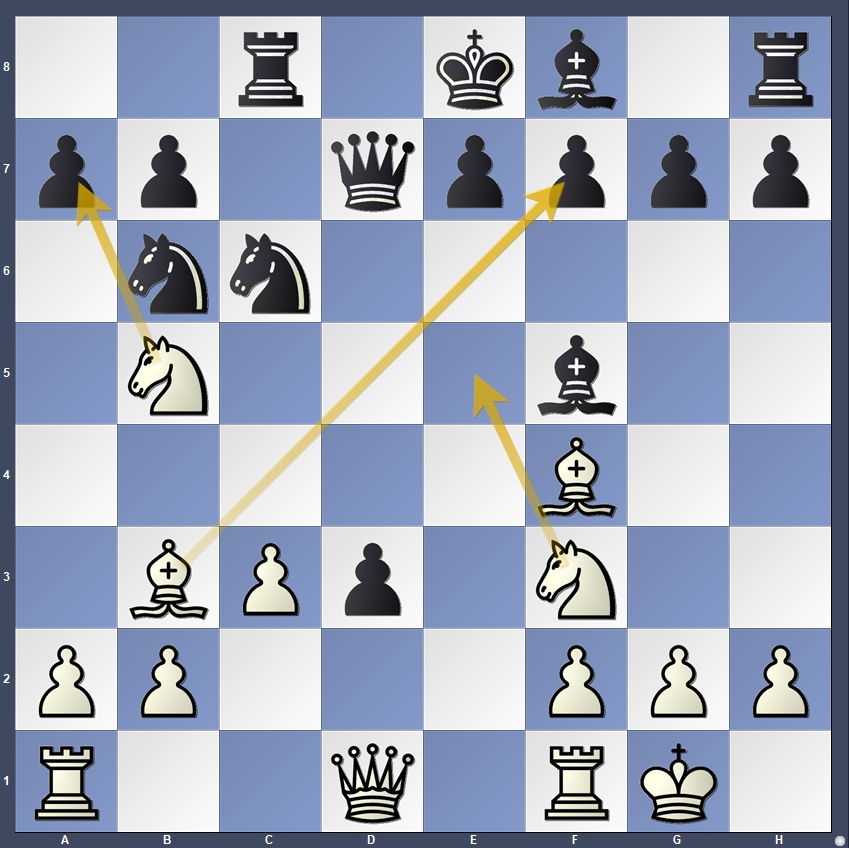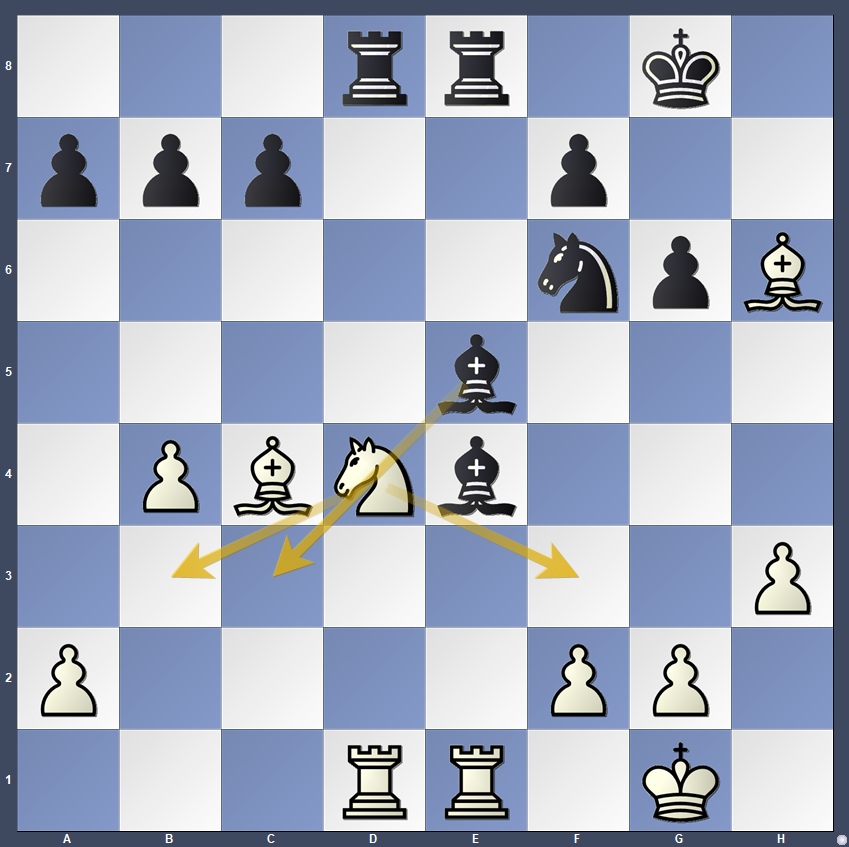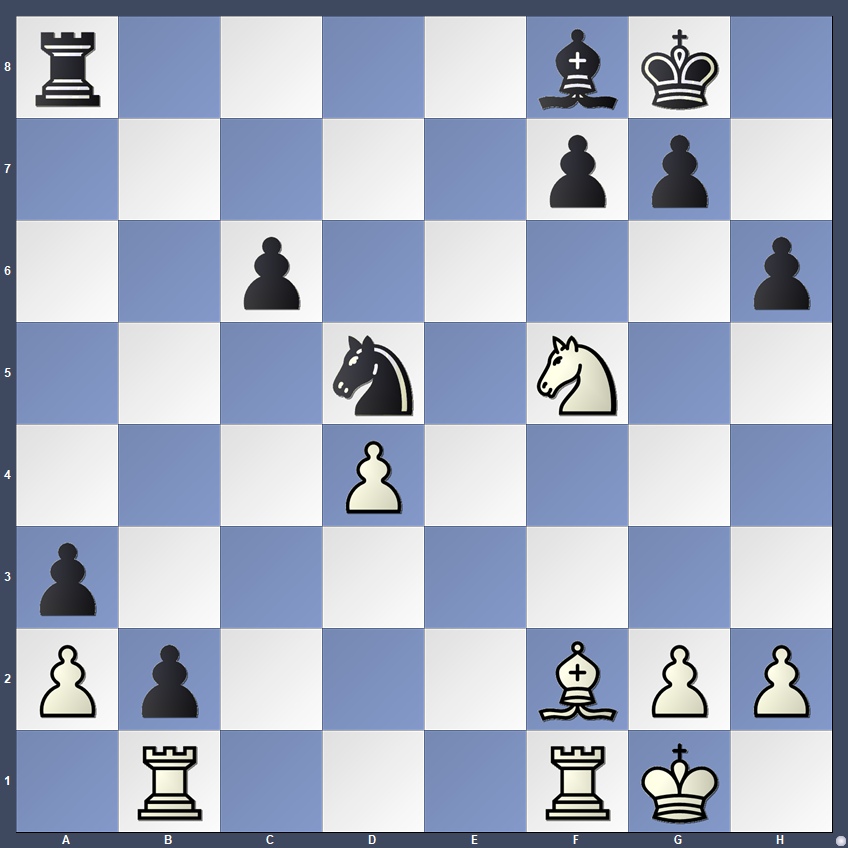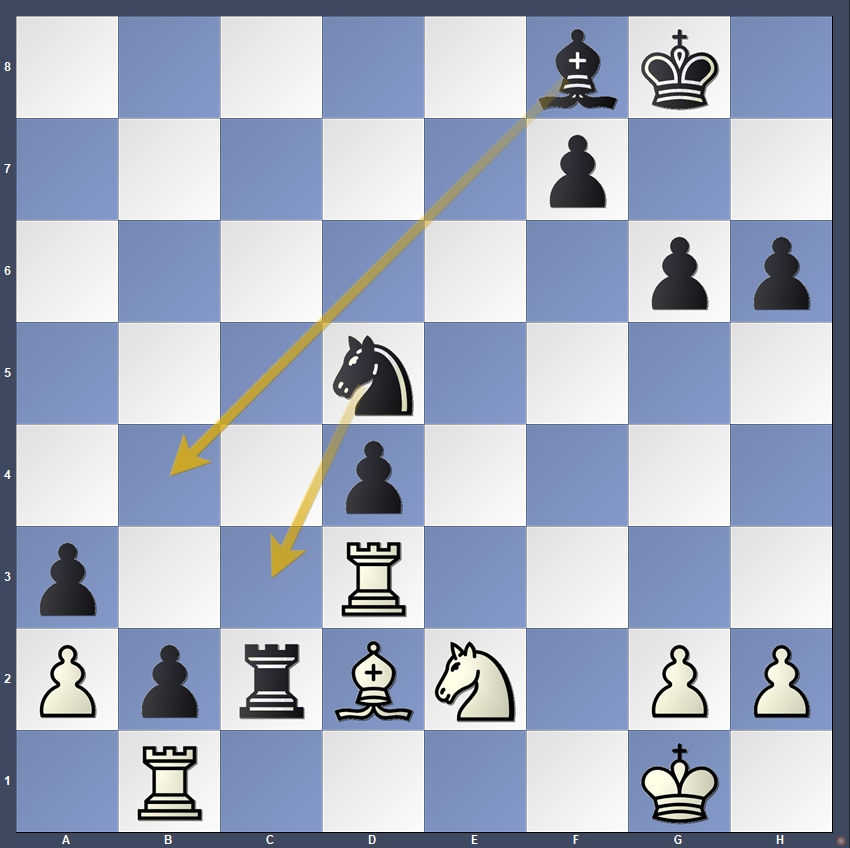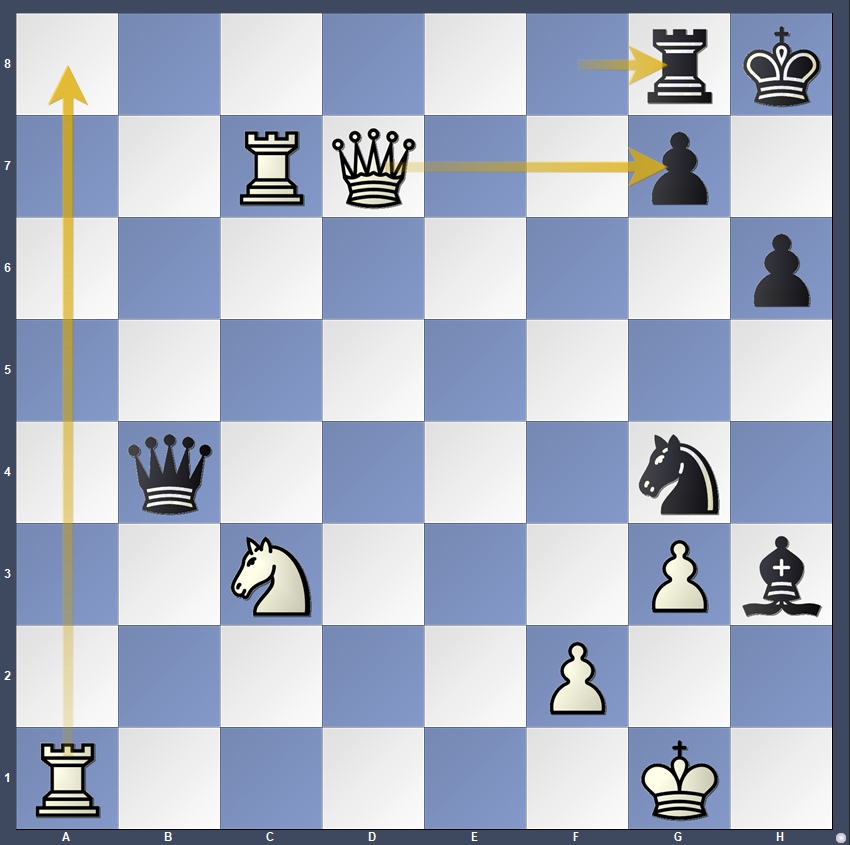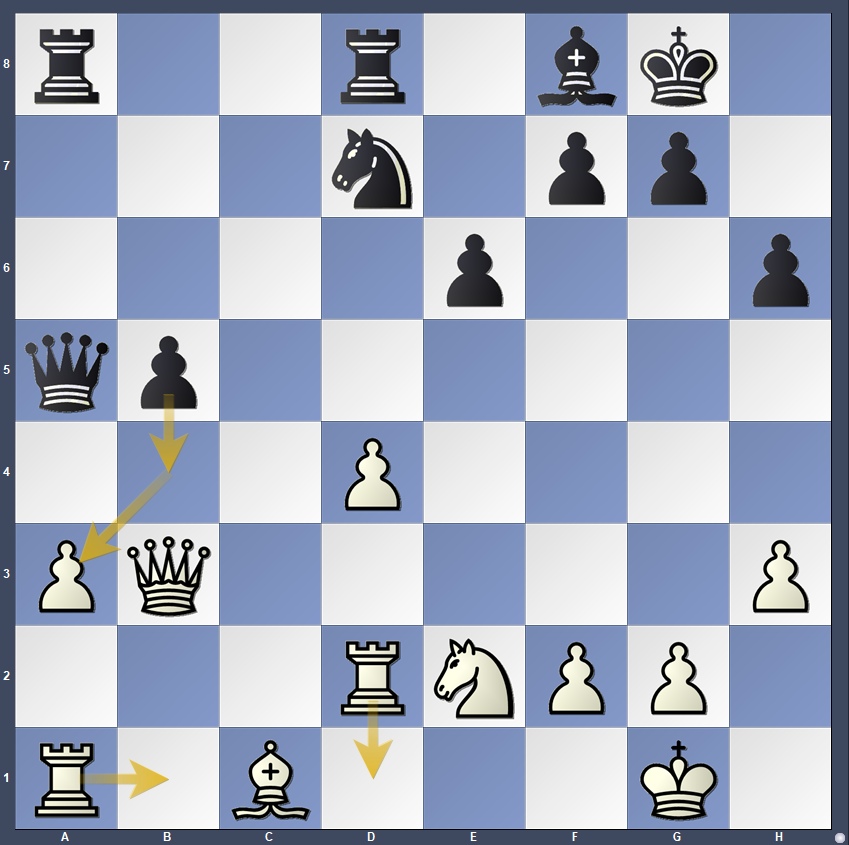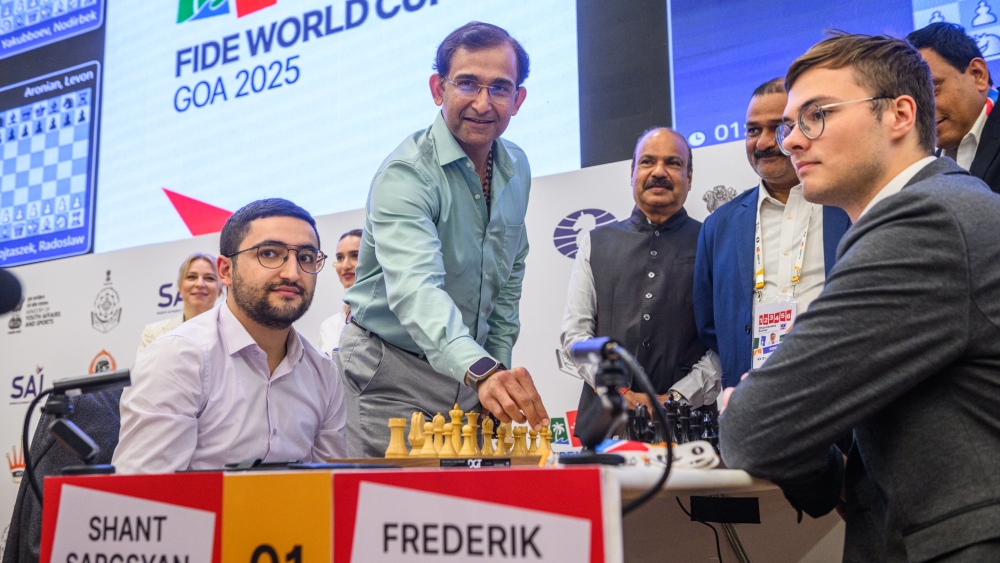
The tension in Goa was palpable as the Round of 32 of the FIDE World Cup resumed, with sixteen matches poised on a knife’s edge.
The ceremonial first move, performed by Dr. Sagar Dilip Salgaocar, Managing Director of Geno Pharmaceuticals Pvt Ltd, set the stage for what would become a day filled with fierce strategic battles, high precision, and immense psychological pressure. Each player knew that a single mistake could mean the end of their World Cup journey.
As the clocks started ticking, the players quickly settled into the rhythm of combat. The atmosphere inside the playing hall was a mix of quiet concentration and restrained intensity, the hum of moves being recorded, the soft clatter of captured pieces, and the quiet footsteps of arbiters echoing through the hall.
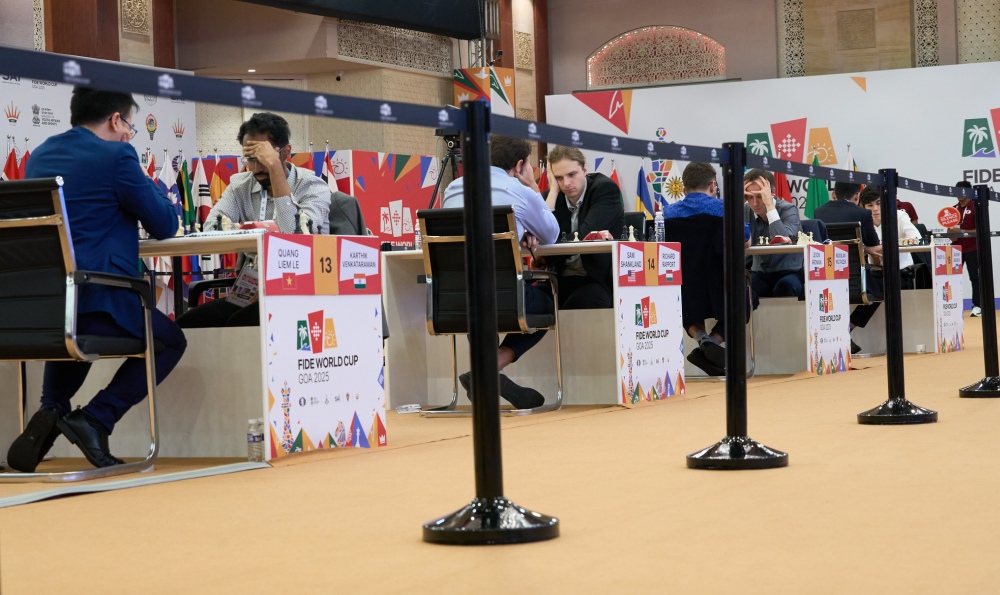
Over the next six hours, fans witnessed a fascinating blend of caution and courage. While some grandmasters opted for pragmatic draws to secure qualification, others risked it all in pursuit of victory. From José Martínez Alcántara’s confident progression to the next stage to Levon Aronian’s creative handling of complications and Le Quang Liem’s composed elimination of Karthik Venkataraman, the day offered no shortage of drama.
Yet, as so often happens at this stage of the event, many matches remained deadlocked, setting up a thrilling tiebreak showdown to decide who advances to the coveted final sixteen.
Let’s take a deeper look into this afternoon’s action at the Rio Resort on Goa.
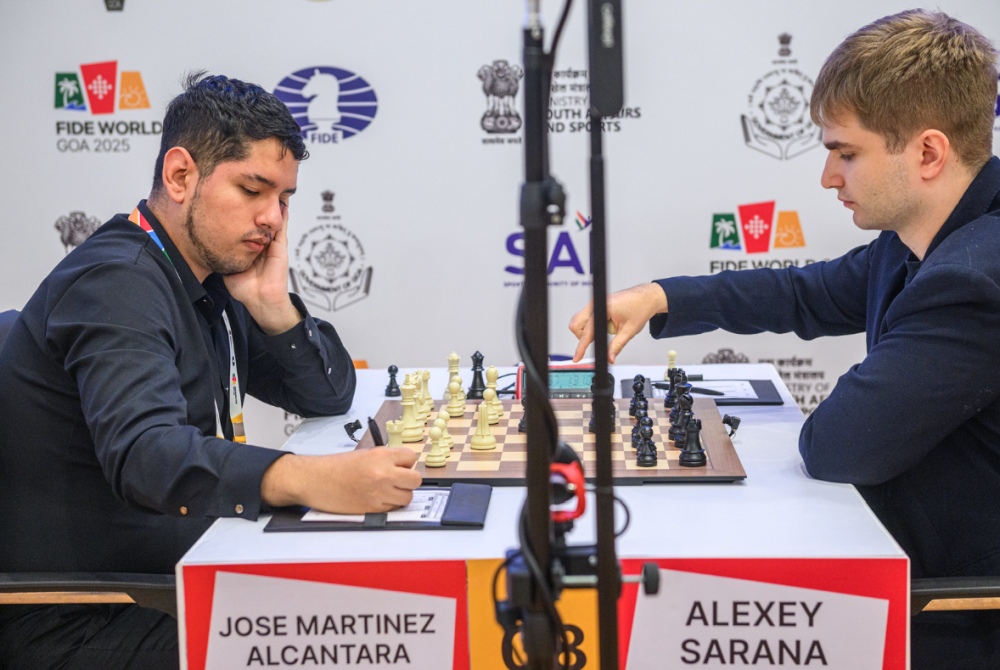
Roughly an hour and a half into play, GM José Eduardo Martínez Alcántara (2644) became the first player to qualify for the final sixteen after forcing a draw against GM Alexey Sarana (2661).
Having secured victory with Black in the previous game, the Mexican grandmaster only needed a draw with White to advance. Following his successful choice from the previous round, Martínez opted for the 2.c3 Alapin Variation against the Sicilian.
Sarana appeared unfamiliar with the subtleties of the line and soon slipped in his move order. Sensing the opportunity, Martínez seized the initiative with the striking piece sacrifice 13.Nxa7! Nxa7 14.Ne5!, creating a double attack on the queen and the f7-pawn. This well-known opening trap has appeared at least five times before in master play, with five wins for White.
However, after 14…Qb5 15.Bxf7+ Kd8, Martínez wisely chose the practical route, repeating moves with 16.Bb3 Ke8 17.Bf7+. Sarana had no real alternative but to accept the draw, as declining it would have meant losing significant material — and with it, his spot in the event.
After confirming his qualification, Martínez joined the broadcast studio to share his thoughts on the game.
Immediately afterwards, the first draw of the afternoon was confirmed – coincidentally, between the same players who had battled for over 110 moves in one of yesterday’s final games to finish.
Playing with White, GM Gabriel Sargissian (2624) agreed to a draw with GM Awonder Liang (2710), meaning their match will be decided tomorrow afternoon in the tiebreaks.
In a classical Catalan Opening, Sargissian achieved a slight edge out of the opening, but Liang gradually neutralized the position, and a threefold repetition was reached around move thirty.
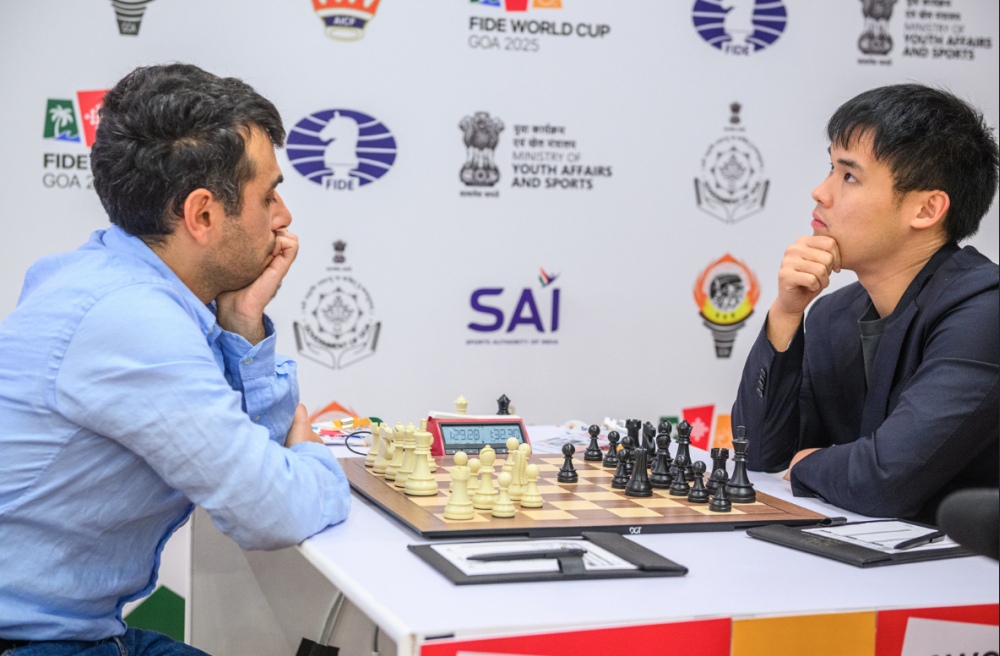
GMs Lorenzo Lodici (2560) and Samuel Sevian (2698) continued their consistent form in Goa with a 32-move draw by repetition in a standard Italian Opening. Playing flawlessly, both grandmasters achieved a 99% accuracy score in a topical line previously tested by Lodici’s teammate, GM Daniele Vocaturo.
Following yesterday’s topsy-turvy encounter, GM Daniil Dubov (2684) chose a deeply theoretical line in the Vienna Variation of the Ragozin Defence against GM Praggnanandhaa R (2771), perhaps aiming to surprise his young opponent.
However, Praggnanandhaa was fully prepared, defending with 99% accuracy and steering the game into an equal rook-and-pawn ending. A draw was agreed on move thirty, another addition to the long list of balanced results in this heavily analysed correspondence line.
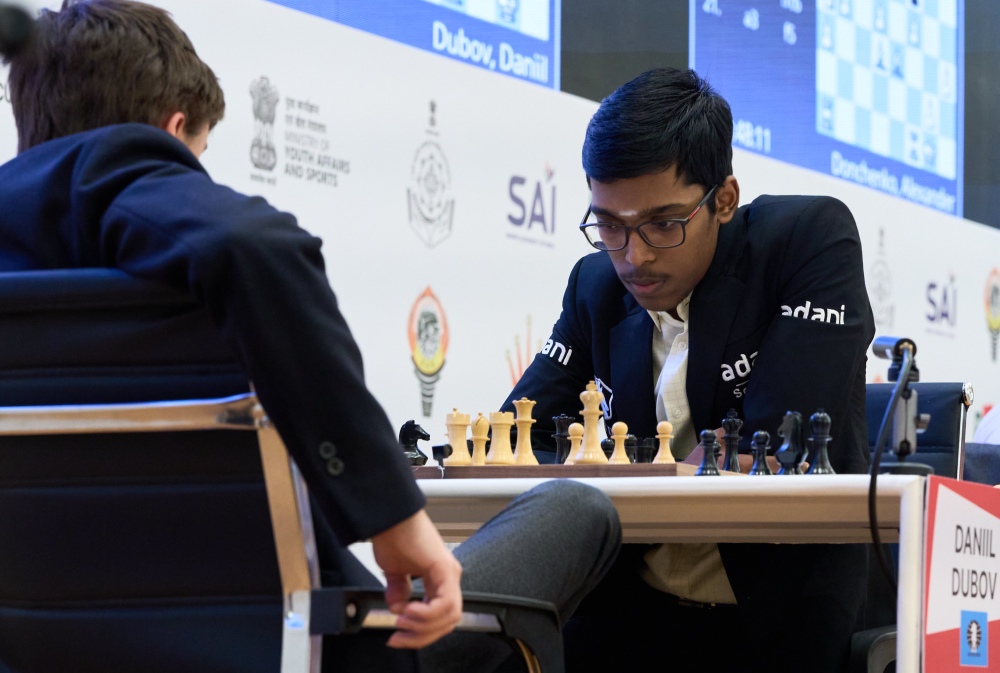
Dubov, World Rapid Champion in 2018, when he triumphed ahead of Carlsen, Mamedyarov, and Nakamura, often shines when the clock runs low, making their upcoming tiebreak one of the most anticipated of the day.
The sequence of draws didn’t end there: with elimination on the line, few players were willing to take undue risks. Within the next forty-five minutes, five additional games were drawn, adding ten more names to tomorrow’s increasingly crowded tiebreak roster.
It was a solid draw with a 98% accuracy score between GM Aleksey Grebnev (2611) and GM Maxime Vachier-Lagrave (2737). Playing the 3.Bb5 Moscow Variation against the Frenchman’s Sicilian Defence, Grebnev steered the game into a French-type pawn structure after a few early exchanges.
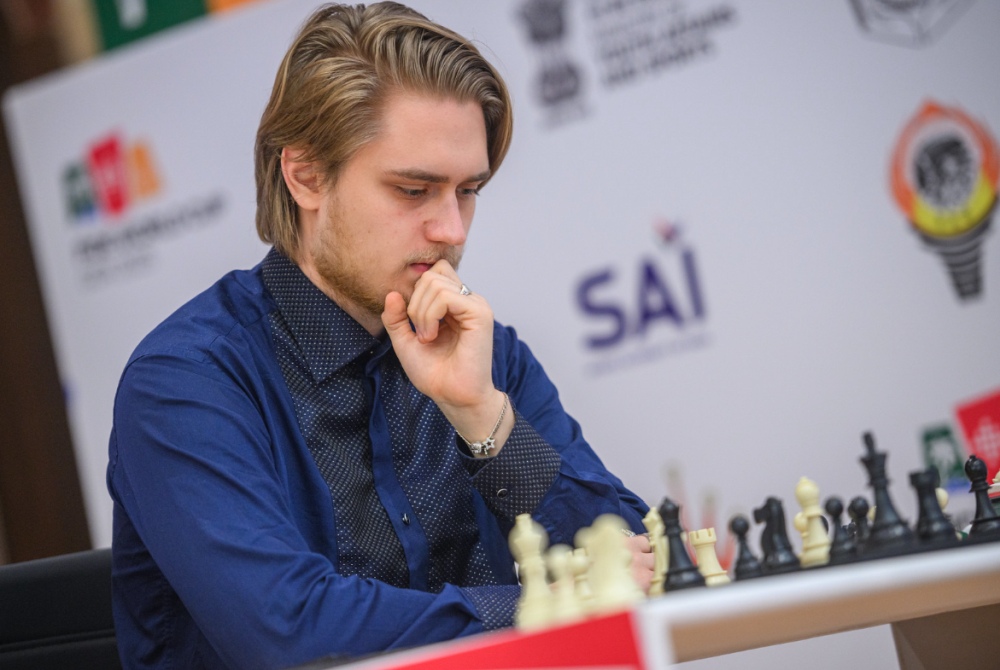
In his post-game interview with WIM Charlize van Zyl, Vachier-Lagrave admitted that he wasn’t particularly familiar with his opponent:
“I didn’t know much about Grebnev until about a month ago, when he played a qualifying match for the World Cup against my team colleague GM Marc’Andria Maurizzi. He’s very solid and very confident.”
Grebnev managed to secure a small edge, exerting some control over the e5-square, but never enough to truly trouble the French number one. The game soon fizzled out into a draw by repetition around move thirty.
The game between GM Richard Rapport (2724) and GM Sam Shankland (2654) also ended peacefully, this time with an impressive 99% accuracy score from both players. The two followed a 2018 Neo-Grünfeld encounter between top grandmasters Sjugirov and Li Chao until move thirteen.
Shankland played quickly and confidently, suggesting deep home preparation, while Rapport appeared to be navigating largely on his own. The engines offered no significant improvements for either side – a truly flawless game.
It’s hard to call a favourite in tomorrow’s tiebreak: both players have already proven themselves under pressure, with Shankland eliminating Vidit, and Rapport prevailing against Erdogmus earlier in the event.
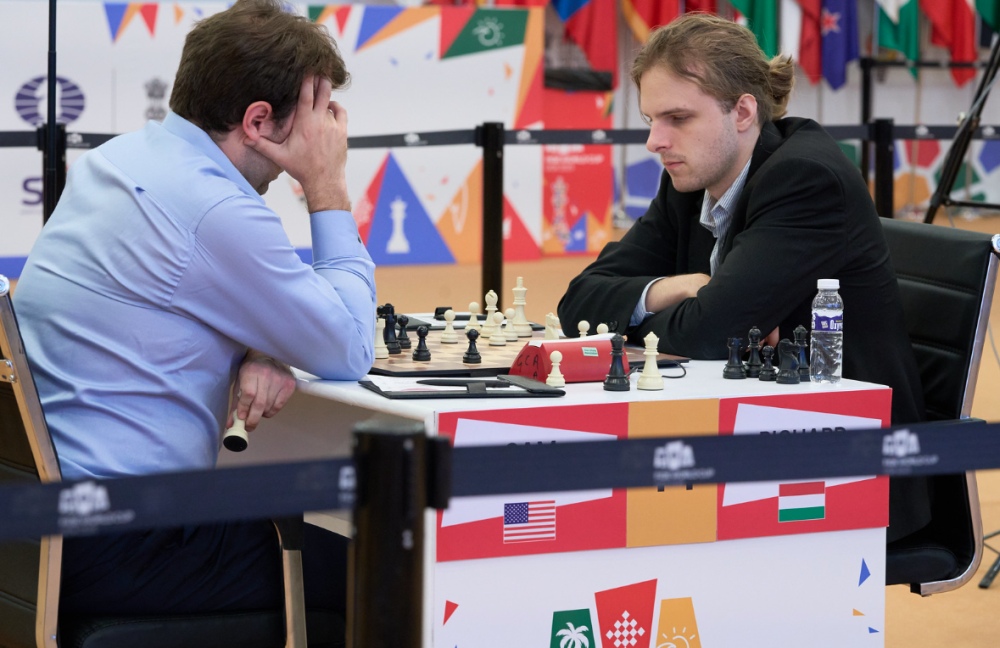
GM Shant Sargsyan (2667) and GM Frederik Svane (2638) produced yet another draw of exceptional quality, both recording a 99% accuracy score. In the second Catalan Opening of the day, Sargsyan opted for a line that netted him a clean pawn, but in return allowed Svane to establish a strong knight versus bad bishop imbalance.
Interestingly, this exact line had already been tested by GM Rasmus Svane (2620), Frederik’s older brother, in a 2022 encounter against GM Tamas Banusz (2610), a game that also concluded in a solid draw. Clearly, the Svane family has done its homework in this system.
Meanwhile, on the next board, GM Arjun Erigaisi (2773) faced GM Peter Leko (2666) in what many expected to be one of the most testing matches of the day. Playing with White, Erigaisi was widely predicted to push hard for a win, but the ever-reliable Hungarian veteran once again proved he’s an incredibly tough nut to crack.
Leko employed the Capablanca Variation of the Nimzo-Indian Defence, unveiling an interesting novelty as early as move fifteen. Erigaisi, however, was perfectly prepared and maintained steady pressure on Leko’s slightly weakened pawn structure. The Hungarian’s legendary defensive technique came to the fore, and after 36 moves, the players agreed to a draw, each posting another outstanding 98% accuracy score.
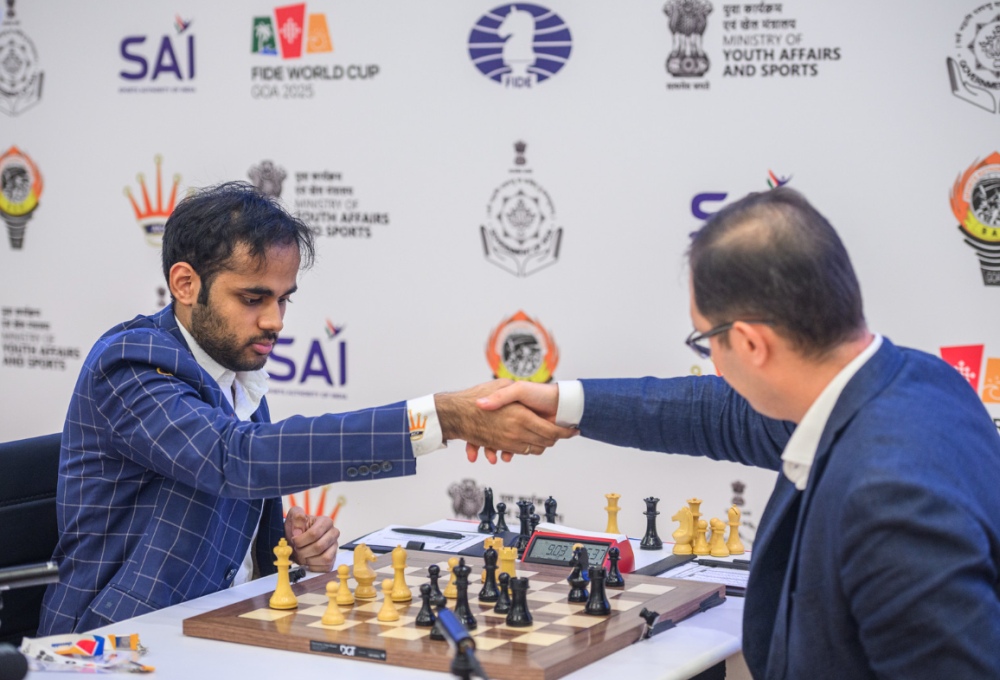
For many reasons, this promises to be one of the most fascinating tiebreak matchups of tomorrow’s round – the youthful ambition and sharp calculation of Erigaisi pitted against Leko’s vast experience, classical understanding, and stamina in long matches.
Did GM Nils Grandelius (2645) miss a chance today? Playing with the Black pieces against GM Pentala Harikrishna (2697), the Swedish number one unveiled a new but risky idea in the Italian Game. Although the setup looked slightly dubious at first glance, it was clear that Grandelius had done his homework in depth, as he emerged from the opening with comfortable equality.
The critical moment of the game arose just after move twenty.
At this point, White was still objectively fine, but precision was required. Harikrishna, well-prepared and confident, played 21.Nb3 almost instantly, relying on his prior analysis. However, this move allowed Grandelius the tactical shot 21…Bc3!, a powerful double attack on the rook and the b4-pawn. The subtle 21.Nf3 would have maintained equality instead.
After 22.Rxd8 Rxd8 23.Rc1 Bxb4, Grandelius emerged a clear pawn up, seemingly on course for a tangible advantage. Yet from that moment onward, Harikrishna displayed flawless technique, steering the game into an equal minor piece ending, precisely the kind of position where an extra pawn isn’t enough to convert.
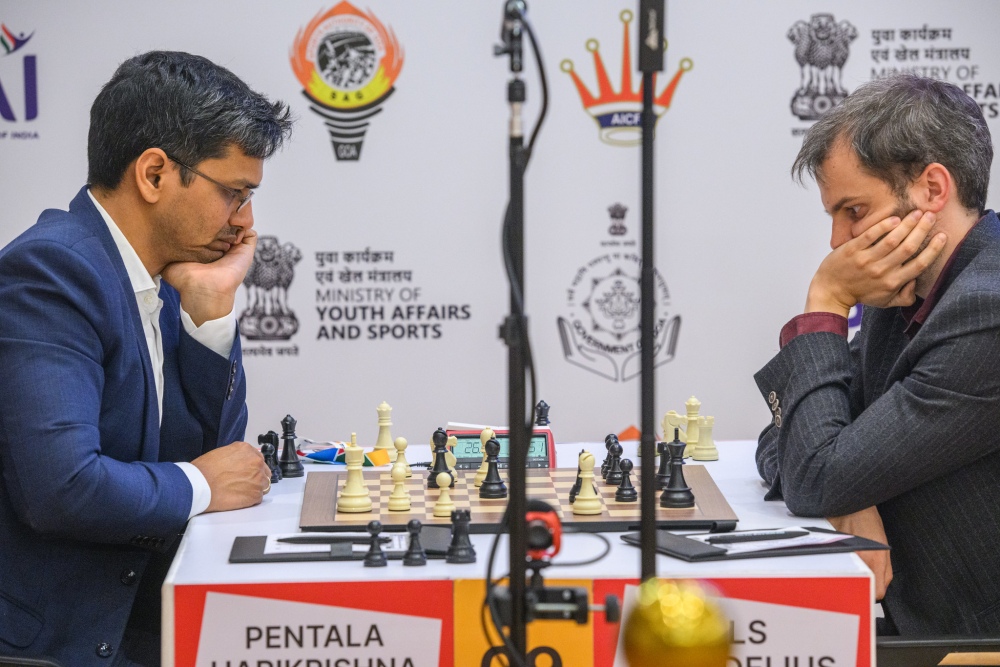
In the end, a draw was agreed, but one couldn’t help feeling that Grandelius might have let half a chance slip away.
Around the same time, another game concluded in a draw, but this one had major consequences as it meant a new player had qualified for the final sixteen. And what a fascinating encounter it was!
Playing with the Black pieces, two-time World Cup winner GM Levon Aronian (2722) only needed a draw to secure his place in the next round after winning the first game of the mini-match. His opponent, GM Radosław Wojtaszek (2654), however, was determined not to go down without a fight.
Aronian surprised early on by sacrificing material straight out of the opening to establish a dangerous passed pawn on b2, deep in White’s camp. “I thought I would get a lot of play,” Aronian explained afterward.
“I felt I had enough compensation for the rook, but now I see that my opponent had a move that might have been difficult for me. I didn’t calculate much, but I felt that there must be something in the air in this position,” he added later, after reviewing the game on the broadcast.
A few moves later, Aronian actually spotted a potential winning line, but uncertainty prevailed, and he instead chose a forcing continuation that led to a draw.
In the game, Aronian played 31…Bb4, allowing Wojtaszek to return the extra rook with 32.Bxb4 Nxb4 33.Nxd4 Rc5 34.Rd2! Nxa2 35.Rbxb2, resulting in an immediate draw.
The engine, however, reveals that 31…Nc3! was the key to victory: after 32.Bxc3 dxc3 33.Nxc3 Rc1+! 34.Kf2 Bg7!, Black would have reached a winning zugzwang. Aronian later admitted he had seen the idea during the game, but didn’t fully realize its decisive potential.
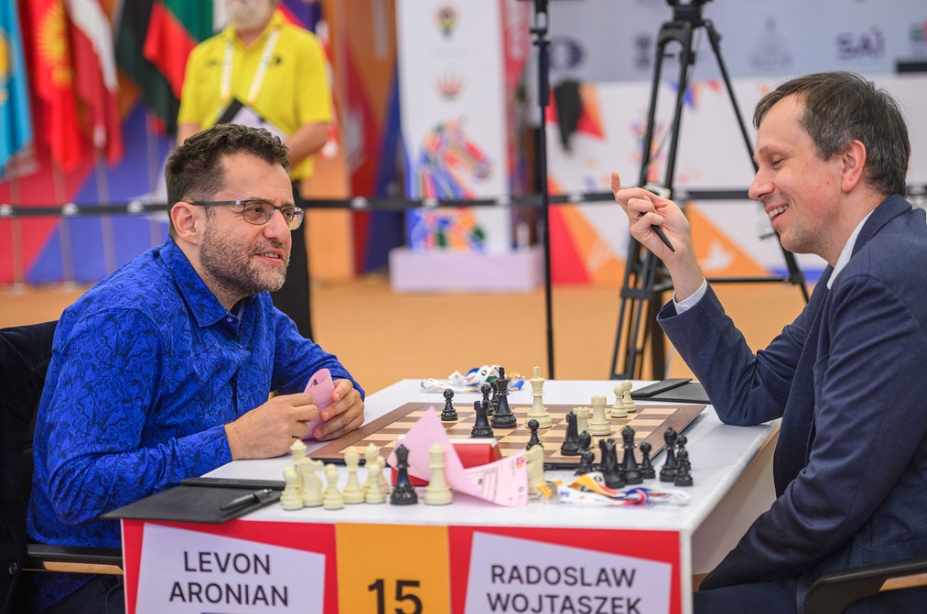
Soon after, the first decisive results of the day began to arrive. Uzbekistan’s GM Nodirbek Yakubboev (2689) became the next player to book his spot in the final sixteen, defeating GM Pranav V (2641) in a commanding display of attacking chess that concluded with a beautiful tactical flourish.
Under enormous tactical pressure, Pranav had just parried a direct checkmate on g7 with 37…Rg8, but Yakubboev had already foreseen the decisive blow: 38.Ra8! a stunning move that leaves Black helpless. There is simply no way to prevent Qxg7# without losing the queen, sealing Yakubboev’s qualification in style.
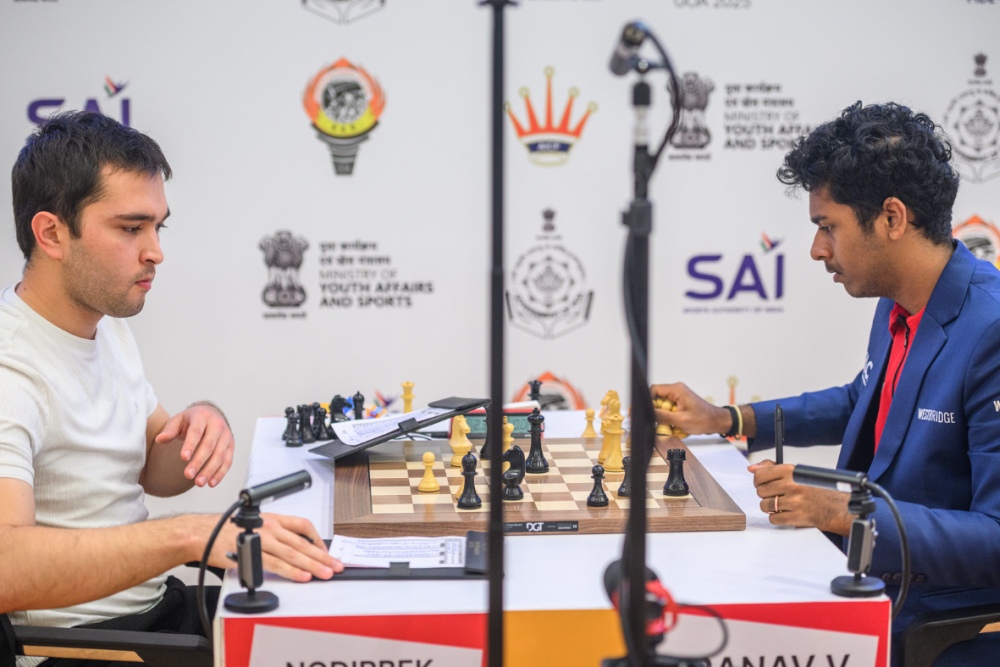
The second decisive result of the day came from the all-German clash between GM Alexander Donchenko (2641) and GM Matthias Bluebaum (2687).
“The game was very solid, very dry, and seemed to be heading towards a draw, but then my opponent made a couple of inaccuracies, and from that point, I think I played quite cleanly to win,” explained Donchenko in his post-game interview with Charlize van Zyl.
Reflecting on the preparation, Donchenko noted that both players knew each other extremely well, including what openings and ideas the other might bring to the board. “Today it worked out better for me,” he added with a smile.
With this victory, Donchenko advances to the final sixteen, having impressively eliminated both Anish Giri and Matthias Bluebaum, the winner and runner-up of the FIDE Grand Swiss, and both already qualified for the 2026 Candidates Tournament.
As the day drew to a close, three more games ended peacefully, though not without missed opportunities. All of them will now be decided in tomorrow’s tiebreaks.
GM Wei Yi (2754) came agonizingly close to securing his place in the next round but misplayed a bishop ending with an extra pawn against GM Parham Maghsoodloo (2701), allowing the Iranian star to escape with a draw.
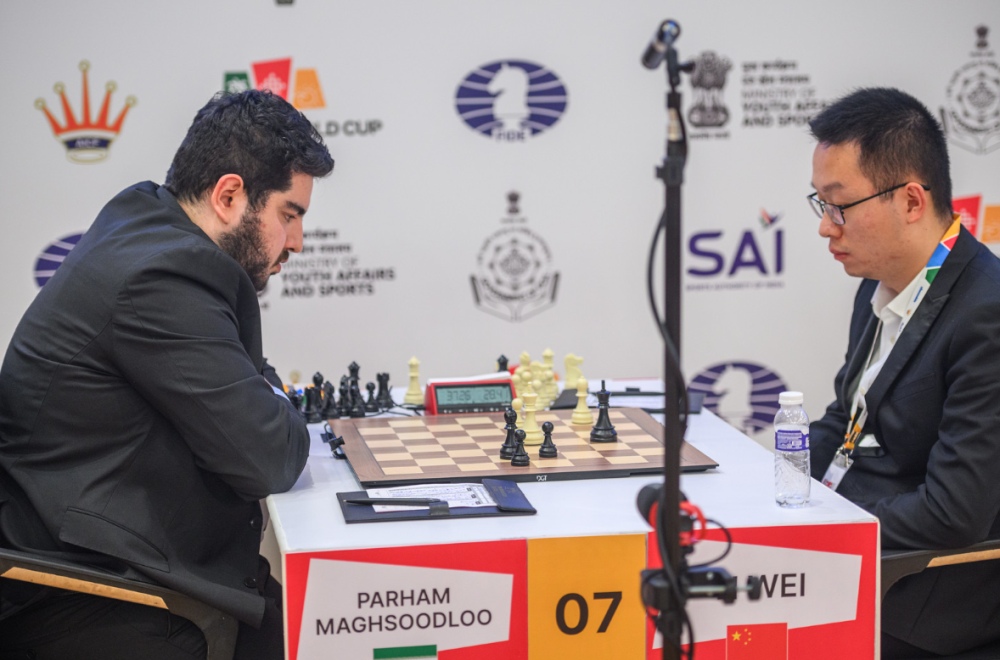
A similar story unfolded between GM Javokhir Sindarov (2721) and GM Yu Yangyi (2720), whose precise play led to another drawn bishop ending.
Meanwhile, GM Vincent Keymer (2755) and GM Andrey Esipenko (2693) battled for 57 moves in a tense encounter marked by 98% accuracy from both players, a fitting conclusion to a day defined by balance and resilience on all boards.
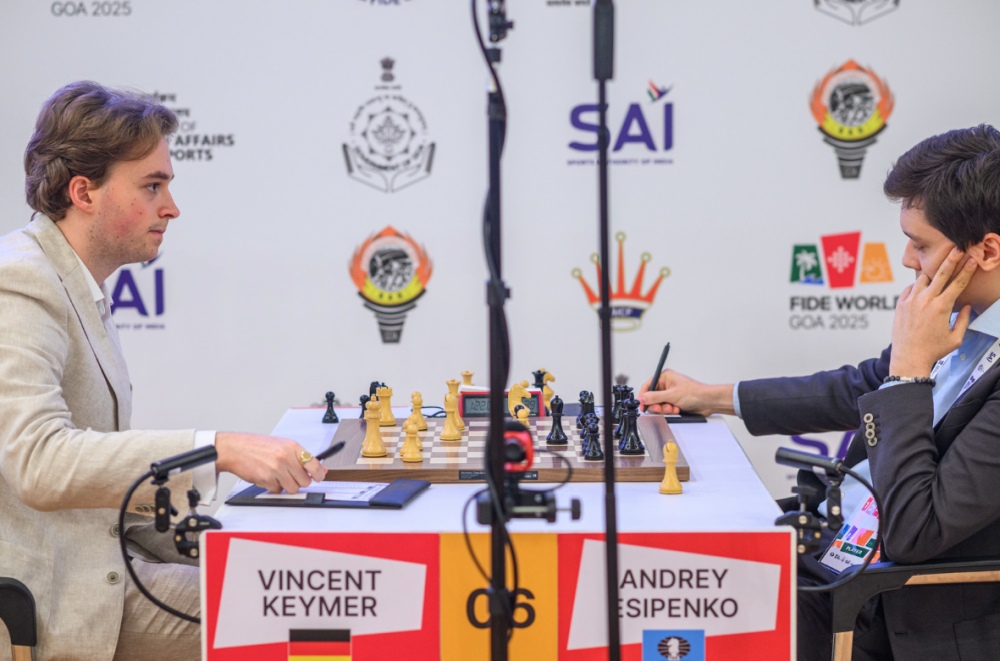
The final game to finish, and the one that officially closed the day’s playing session, saw GM Le Quang Liem (2729) deliver a precise victory over GM Karthik Venkataraman (2579), eliminating the Indian national champion from the World Cup and securing his own spot in the final sixteen.
In the critical moment of the game, after 24…axb5, Karthik had to find the accurate 25.Rb1, targeting the b5-pawn while also stepping out of a dangerous pin. Instead, he erred with 25.Rd1??, allowing the strong tactical response 25…b4!. The pawn could not be captured due to the pin on the rook, and soon after Le Quang Liem broke through with …bxa3, converting his advantage into a decisive and clinical win.
With the dust settling on a long and tense day in Goa, the field for the final sixteen is almost complete. José Martínez Alcántara, Levon Aronian, Nodirbek Yakubboev, Alexander Donchenko, and Le Quang Liem were today’s qualifiers, while a record number of matches, including heavyweights like Praggnanandhaa, Dubov, Wei Yi, Rapport, and Erigaisi, will return tomorrow for what promises to be an electric tiebreak session.
The Round 4 tiebreaks will be played on November 13th at 3 PM local time.
The action can be followed live on the FIDE YouTube Channel, featuring expert commentary by GMs Evgenij Miroshnichenko and Jan Gustafsson.
To watch the games in person, tickets can be purchased [HERE]
Official website: worldcup2025.fide.com/
Written by IM Michael Rahal
Photos: Michal Walusza and Eteri Kublashvili



